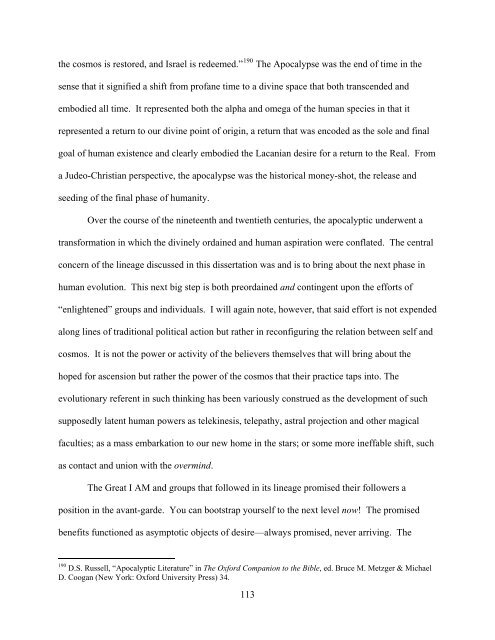A Genealogy of the Extraterrestrial in American Culture
A Genealogy of the Extraterrestrial in American Culture
A Genealogy of the Extraterrestrial in American Culture
You also want an ePaper? Increase the reach of your titles
YUMPU automatically turns print PDFs into web optimized ePapers that Google loves.
<strong>the</strong> cosmos is restored, and Israel is redeemed.” 190 The Apocalypse was <strong>the</strong> end <strong>of</strong> time <strong>in</strong> <strong>the</strong><br />
sense that it signified a shift from pr<strong>of</strong>ane time to a div<strong>in</strong>e space that both transcended and<br />
embodied all time. It represented both <strong>the</strong> alpha and omega <strong>of</strong> <strong>the</strong> human species <strong>in</strong> that it<br />
represented a return to our div<strong>in</strong>e po<strong>in</strong>t <strong>of</strong> orig<strong>in</strong>, a return that was encoded as <strong>the</strong> sole and f<strong>in</strong>al<br />
goal <strong>of</strong> human existence and clearly embodied <strong>the</strong> Lacanian desire for a return to <strong>the</strong> Real. From<br />
a Judeo-Christian perspective, <strong>the</strong> apocalypse was <strong>the</strong> historical money-shot, <strong>the</strong> release and<br />
seed<strong>in</strong>g <strong>of</strong> <strong>the</strong> f<strong>in</strong>al phase <strong>of</strong> humanity.<br />
Over <strong>the</strong> course <strong>of</strong> <strong>the</strong> n<strong>in</strong>eteenth and twentieth centuries, <strong>the</strong> apocalyptic underwent a<br />
transformation <strong>in</strong> which <strong>the</strong> div<strong>in</strong>ely orda<strong>in</strong>ed and human aspiration were conflated. The central<br />
concern <strong>of</strong> <strong>the</strong> l<strong>in</strong>eage discussed <strong>in</strong> this dissertation was and is to br<strong>in</strong>g about <strong>the</strong> next phase <strong>in</strong><br />
human evolution. This next big step is both preorda<strong>in</strong>ed and cont<strong>in</strong>gent upon <strong>the</strong> efforts <strong>of</strong><br />
“enlightened” groups and <strong>in</strong>dividuals. I will aga<strong>in</strong> note, however, that said effort is not expended<br />
along l<strong>in</strong>es <strong>of</strong> traditional political action but ra<strong>the</strong>r <strong>in</strong> reconfigur<strong>in</strong>g <strong>the</strong> relation between self and<br />
cosmos. It is not <strong>the</strong> power or activity <strong>of</strong> <strong>the</strong> believers <strong>the</strong>mselves that will br<strong>in</strong>g about <strong>the</strong><br />
hoped for ascension but ra<strong>the</strong>r <strong>the</strong> power <strong>of</strong> <strong>the</strong> cosmos that <strong>the</strong>ir practice taps <strong>in</strong>to. The<br />
evolutionary referent <strong>in</strong> such th<strong>in</strong>k<strong>in</strong>g has been variously construed as <strong>the</strong> development <strong>of</strong> such<br />
supposedly latent human powers as telek<strong>in</strong>esis, telepathy, astral projection and o<strong>the</strong>r magical<br />
faculties; as a mass embarkation to our new home <strong>in</strong> <strong>the</strong> stars; or some more <strong>in</strong>effable shift, such<br />
as contact and union with <strong>the</strong> overm<strong>in</strong>d.<br />
The Great I AM and groups that followed <strong>in</strong> its l<strong>in</strong>eage promised <strong>the</strong>ir followers a<br />
position <strong>in</strong> <strong>the</strong> avant-garde. You can bootstrap yourself to <strong>the</strong> next level now! The promised<br />
benefits functioned as asymptotic objects <strong>of</strong> desire—always promised, never arriv<strong>in</strong>g. The<br />
190 D.S. Russell, “Apocalyptic Literature” <strong>in</strong> The Oxford Companion to <strong>the</strong> Bible, ed. Bruce M. Metzger & Michael<br />
D. Coogan (New York: Oxford University Press) 34.<br />
113















